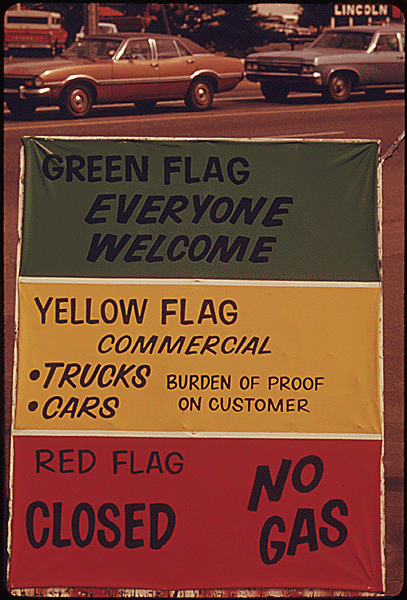*Image Credit: Wikimedia Commons The Organization of the Petroleum Exporting Countries (OPEC), furious military supplies were being provided to Israel by the United States during the Yom Kippur War, took a remarkable step on October 17, 1973: instating an oil embargo against one of the largest consumers in the world. Sending shockwaves through the world economy, the decision has had a lasting effect on markets in every time zone. Seeds for the blockade were planted in the summer of 1971, when the American government opted to take the US Dollar off the Gold Exchange Standard. As the currency depreciated, the value of a barrel of oil was directly affected — a dollar was no longer stable, leaving producers to wonder what profit margins would be from one day to the next. OPEC spent years attempting to devise a means to keep pace with the swings of the market. When Syria and Egypt launched a surprise attack on Israel to start the Yom Kippur War in early October 1973, the system received another negative stimulus. With other oil-producing nations engaged in combat — Syria and Egypt were not a part of OPEC, despite being petroleum exporters — the price would increase as production was either diverted to fill military needs or halted altogether. To make matters worse, the Soviets began shipping arms to their Arab allies, prompting Operation Nickel Grass — American cargo planes delivering materiel to Israel. Fed up with low oil prices and astronomical markups on Western imports like grain, OPEC leaders announced a 70 percent increase in the cost of a barrel of oil. On October 17, 1973, ministers took the measure further: there would be a slight cut in production for the following several months in order to help accelerate their political and economic goals. In response, Nixon urged Congress to appropriate a massive package of monetary aid to Israel two days later. Calling the US a “principal hostile country,” Libya and the rest of OPEC set up an all-out embargo with a ripple effect against other nations in Western Europe and Japan. (Many of them found ways to distance themselves from America in order to face less significant problems.) With fuel consumption at an all-time high, the US was in a poor position to negotiate. Members of OPEC set the rules for bargaining, opting to put the Americans in the middle of peace negotiations between Syria, Egypt and Israel in order to open the possibility of ending the embargo. By mid-January 1974, Henry Kissinger had managed to formulate a plan for Israel’s withdrawal from territory it had conquered in its neighboring countries, one the Israelis agreed to the following May. Satisfied with the outcome, OPEC had reopened shipping to the United States in March 1974, but the economic affects would be felt for months to come. The price of oil had jumped to $12 per gallon, four times what it had been, leaving many filling stations short on fuel — in the month of February, just days before the embargo ended, 1 in 5 had no gas at all. In the wake of the crisis, a variety of changes occurred in the United States in order to reduce the use of the “oil weapon” in the future. The number of large car models available at dealers dropped significantly as smaller cars made by foreign manufacturers became the rage. A national speed limit of 55mph was instituted in order to force drivers to burn fuel more efficiently. Western countries began an earnest search for alternative sources of fuel for heat and electricity. Though the direct economic effects were generally overcome by the 1980s, the effects of the 1973 oil embargo can still be seen today, particularly as nations further develop technologies created in the wake of the crisis to produce sustainable forms of energy. Also On This Day: 539 BCE – Cyrus the Great frees the Jews from the 70-year Babylonian Captivity 1781 – British General Lord Charles Cornwallis surrenders at the Siege of Yorktown, giving the United States victory in its War for Independence 1860 – First edition of The Open Championship golf tournament in Britain 1931 – Mob boss Al Capone is convicted of tax evasion and sentenced to 11 years in prison 1979 – Mother Teresa is awarded the Nobel Peace Prize
October 17 1973 CE – OPEC Proclaims an Oil Embargo Against the US for Aiding Israel
*Image Credit: Wikimedia Commons The Organization of the Petroleum Exporting Countries (OPEC), furious military supplies were being provided to Israel by the United States during the Yom Kippur War, took…
409
